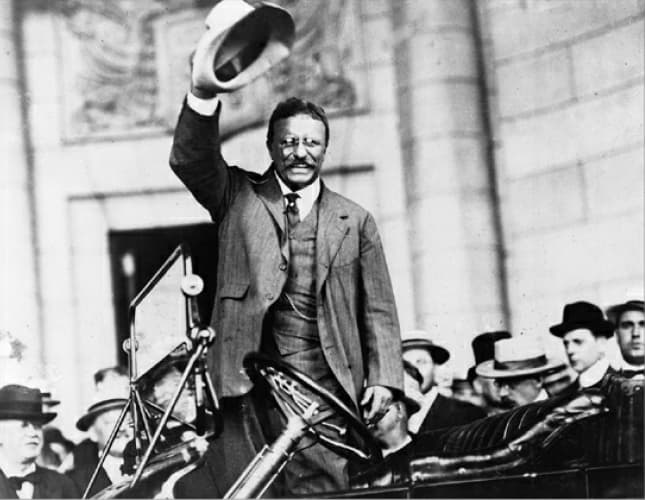Theodore Roosevelt, the Pluralistic President
How was it that TR, a man of privilege and a close friend of Henry Cabot Lodge, an antisemite whom TR does not seem to have called out for his prejudice, did so much for Jews?

‘American Macabee: Theodore Roosevelt and the Jews’
By Andrew Porwancher
Princeton University Press, 368 Pages
On both a personal and a policy level, Theodore Roosevelt was a philo-semite. He admired the Maccabees, Jewish warriors who established an independent Jewish kingdom, and had Jews among his company who charged up San Juan Hill in the Spanish-American War. Roosevelt’s sparring partner was a Russian Jew who stood vigil after TR’s death. When a famous antisemite came to speak at Manhattan, TR organized 30 Jewish policemen to protect him as a demonstration of religious freedom and the right to express even repugnant beliefs.
Andrew Porwancher is at pains not to write a hagiography, noting that TR sometimes reverted to ethnic slurs. Mr. Porwancher might have observed, however, that TR tended to use such language when he was angry at political opponents. That is not to excuse the use of derogatory language, but simply to say such lapses did not reflect a mindset.
How was it that TR, a man of privilege and a close friend of Henry Cabot Lodge, an antisemite whom TR does not seem to have called out for his prejudice, did so much for Jews, welcoming them as immigrants and strenuously seeking their votes at a time when the Democratic Party had such a strong hold on the Jewish vote?
Mr. Porwancher makes a good deal out of TR’s Dutch ancestry that separated him from others of his class who so proudly proclaimed their Anglo-Saxon superiority. TR embraced the idea of America as a melting pot, offending some Jews who accused him of wanting to dilute or even destroy Jewish identity.
TR’s response to Jewish critics has its contradictions, Mr. Porwancher shows. TR was proud of including so many Jews on the police force when he was commissioner, yet he said he had put them there solely for their merit. He went out of his way to create diversity, yet he claimed diversity was not a criterion — only excellence mattered.
By investigating TR’s complicated relationships with Jews, including several close friendships, Mr. Porwancher also provides new insights into the view of the cowboy president, as he was sometimes called by those who thought him rash and a bully — to use one of his favorite words.
When the tsar’s regime engaged in pogroms, many Jews were disappointed that TR did not intervene, expecting that the soldier-politician who charged up San Juan Hill, and decried human rights abuses in Cuba, would come to the rescue of Jews being murdered in Russian cities and villages. But TR did not see how America could function as the world’s policeman, coming to the aid not only of Jews but of the oppressed population in the Congo and in other countries.
TR believed that the Russian regime was so unstable that even a diplomatic solution to antisemitic attacks seemed out of reach, though he certainly continued to consider ways to negotiate with the tsar, a very stubborn antisemite. In his frustration, TR lashed out at his Jewish critics, mostly in private, deploring their unrealistic demands.
Nothing in TR’s fitful romance with Jews is better exemplified than in his dealings with Jacob Schiff, philanthropist and financier, and Oscar Straus, the first Jewish Cabinet member, appointed by TR as secretary of commerce and labor (1906-09). From TR’s point of view Schiff was always pestering him to do more for Jews in Russia. Given the regime’s intractability, the president thought he might make it even worse for Jews if he put more pressure on the tsar.
The more diplomatic Straus, TR demonstrated, got things done, especially in terms of immigrant Jews. A suspicious Henry Cabot Lodge charged Straus with letting into America poor, physically debilitated Jews. When an investigation yielded no evidence to support Lodge’s accusation, Lodge concluded: “How far his influence is exerted to procure slackness in exclusions I can only say we found no proof.” Mr. Porwancher calls this “antisemitic logic, even a complete lack of evidence that Straus had been malfeasant was insufficient to merit his exoneration.” TR, “unwilling to indulge Lodge’s aspersions,” the biographer concludes, considered Straus vindicated.
If anything, “American Maccabee” is too tentative in its treatment of a president profoundly committed to American pluralism.
Mr. Rollyson’s forthcoming book is “Making the American Presidency: How Biographers Shape History.”

